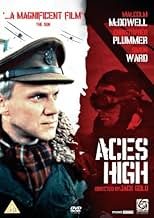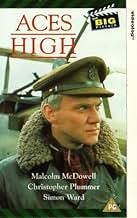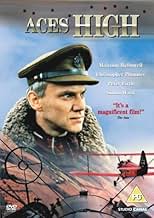IMDb-BEWERTUNG
6,5/10
3407
IHRE BEWERTUNG
Im Ersten Weltkrieg stellt die hohe Unfallrate unter den Nachwuchspiloten des Royal Flying Corps eine enorme Belastung für die Überlebenden dar.Im Ersten Weltkrieg stellt die hohe Unfallrate unter den Nachwuchspiloten des Royal Flying Corps eine enorme Belastung für die Überlebenden dar.Im Ersten Weltkrieg stellt die hohe Unfallrate unter den Nachwuchspiloten des Royal Flying Corps eine enorme Belastung für die Überlebenden dar.
- Regie
- Drehbuch
- Hauptbesetzung
- Nominiert für 1 BAFTA Award
- 1 Gewinn & 2 Nominierungen insgesamt
Gilles Béhat
- Beckenauer
- (as Gilles Behat)
Empfohlene Bewertungen
Aces High - having never seen the movie before, but I had heard of it, I went ahead and bought it, expecting it to be good. It was! The dogfight scenes were very convincing, although stock footage from 'The Blue Max' was used in places, but only to add a sort of 'link' to the footage you saw in the movie. Stampe SV.4s made excellent substitutes for SE5As, but the Stearmans/Tiger Moths and Jungmeisters weren't exactly convincing. But hey, who cares? This is a top notch movie, with good performances and convincing setpieces. See it, enjoy it!
Written from the English point of view, this film seems to have it's tongue in it's cheek at times, but it's not at all funny. There are several flashes of humor in the early scenes, at the expense of the British upper class, but those quickly give way to the special horrors of the first war fought in the air.
Patriotic young pilots straight out of college lost their lives in literally a few days time, due to their inexperience and the stress of this new kind of battle. Malcolm McDowell has the unwelcome task of leading the 76th Squadron and also visiting colleges to drum up recruits, all the while knowing he's inviting them to an almost certain death. He keeps these new recruits at arms length to soften the blow to his mental health when they invariably get shot down. When he shows up at his own alma mater, an idealistic young man, played by Peter Firth, signs up for McDowell's squadron. On his arrival at the airfield, Firth sees the evidence of the turnover in pilots but fails to see the connection to his own longevity; a family photo and personal effects are whisked out of the room he's been assigned, right in front of his eyes. He is introduced to Simon Ward, a stony-faced pilot who by the end of the movie is finally driven insane by the awful, daily anticipation of his own death in battle.
The young pilots experience the respect that their station in the Air Corps elicits from the locals and from women, but at the same time they see how they are more likely to be killed than the average filthy foot soldier. Firth is taken with a local cabaret girl, who invites him to her room one night. The next night, when he expects her to be glad to see him, she ignores him and pays attention to an older, richer officer. The very next day the pilots are given the task of destroying German spotter balloons, which always have heavy gun and air protection, and the older pilots know this is almost a death warrant. Six planes go out, with McDowell and Firth in two of them, but you'll have to watch the film to find out how many come back.
A very good, but depressing, film, McDowell is subdued in his performance and seems to come out of his cocoon only at the end. This is necessary, I think, for his character to survive in the surroundings of constant tragedy. Firth is naive in the extreme, and this probably a correct portrayal of a green recruit in WWI, where there was no frame of reference for how dangerous those early airplanes were. The film shows us just how little the commanders valued the lives of their men by sending them out unprepared and inexperienced, and that they know after one group of fliers is decimated, there is always a fresh batch of innocent boys to take their place. I recommend the film highly, since it has a firm anti-war message.
Patriotic young pilots straight out of college lost their lives in literally a few days time, due to their inexperience and the stress of this new kind of battle. Malcolm McDowell has the unwelcome task of leading the 76th Squadron and also visiting colleges to drum up recruits, all the while knowing he's inviting them to an almost certain death. He keeps these new recruits at arms length to soften the blow to his mental health when they invariably get shot down. When he shows up at his own alma mater, an idealistic young man, played by Peter Firth, signs up for McDowell's squadron. On his arrival at the airfield, Firth sees the evidence of the turnover in pilots but fails to see the connection to his own longevity; a family photo and personal effects are whisked out of the room he's been assigned, right in front of his eyes. He is introduced to Simon Ward, a stony-faced pilot who by the end of the movie is finally driven insane by the awful, daily anticipation of his own death in battle.
The young pilots experience the respect that their station in the Air Corps elicits from the locals and from women, but at the same time they see how they are more likely to be killed than the average filthy foot soldier. Firth is taken with a local cabaret girl, who invites him to her room one night. The next night, when he expects her to be glad to see him, she ignores him and pays attention to an older, richer officer. The very next day the pilots are given the task of destroying German spotter balloons, which always have heavy gun and air protection, and the older pilots know this is almost a death warrant. Six planes go out, with McDowell and Firth in two of them, but you'll have to watch the film to find out how many come back.
A very good, but depressing, film, McDowell is subdued in his performance and seems to come out of his cocoon only at the end. This is necessary, I think, for his character to survive in the surroundings of constant tragedy. Firth is naive in the extreme, and this probably a correct portrayal of a green recruit in WWI, where there was no frame of reference for how dangerous those early airplanes were. The film shows us just how little the commanders valued the lives of their men by sending them out unprepared and inexperienced, and that they know after one group of fliers is decimated, there is always a fresh batch of innocent boys to take their place. I recommend the film highly, since it has a firm anti-war message.
This is an excellent film about WWI Royal Flying Corps and their fights against the Germans over the trenches.
Fantastic cast - McDowell, Trevor Howard, Peter Firth, Simon Ward and Christopher Plummer - they are all some of the best in the business at portraying English upper classes. Especially the mean McDowell (with his ironic speech at Eton 'we are caning them' when they're not really) and the callow Peter Firth, all Boys Own enthusiasm.
Shows the pious nature of the English elite, with John Gielgud as the headmaster spouting out empty platitudes about decency and 'playing the game' while, meanwhile, McDowell is playing dirty tricks on German pilots (the scene where he gets his opponent to land in the field and then destroys him as he walks towards his plane to offer help).
Fantastic aerial shots.
Fantastic cast - McDowell, Trevor Howard, Peter Firth, Simon Ward and Christopher Plummer - they are all some of the best in the business at portraying English upper classes. Especially the mean McDowell (with his ironic speech at Eton 'we are caning them' when they're not really) and the callow Peter Firth, all Boys Own enthusiasm.
Shows the pious nature of the English elite, with John Gielgud as the headmaster spouting out empty platitudes about decency and 'playing the game' while, meanwhile, McDowell is playing dirty tricks on German pilots (the scene where he gets his opponent to land in the field and then destroys him as he walks towards his plane to offer help).
Fantastic aerial shots.
A quiet sense of detachment hangs over the little airfield in the heart of the French countryside where this drama is played out. In the opening scenes, as the ridiculously young Lieutenant played by Peter Firth arrives, there is much talk of tea and biscuits, and everything seems very civilised. But under the serene surface there are a mass of tics and twitches, the causes of which are subdued by forced gaiety and too much alcohol.
Firth hero-worships McDowell's youthful commander – who just happens to be his sister's sweetheart – but McDowell is a tarnished hero. His psychological flaws are emphasised in the opening scenes in which we seem him toying with a German pilot whose plane has crash-landed before scything him down in a hail of bullets from his plane. McDowell needs a drink just to climb into the cockpit (while another ace, played by Simon Ward, feigns neuralgia to escape the terrors of aerial combat) and is haunted by a loneliness borne of the repetitive chore of writing letters of condolence to the families of the teenage fighter pilots who are shot down under his command.
There's nothing particularly groundbreaking in Jack Gold's WWI saga, but it is all professionally staged and acted with some crisply edited aerial sequences. All the situations are familiar, and the film must have seemed a little dated when it was released (around the same time as Star Wars), but there's a reassuring Britishness about it all. Despite the reasonably graphic depiction of the terrible psychological consequences of regularly flying towards one possible death, the film is still something of a throwback to the likes of Hollywood's The Dawn Patrol. Only here, the line between the good guys and the bad guys is blurred, and opposing pilots aren't so blinded by national duty that they can't appreciate and acknowledge the professionalism and spirit of their rivals when the opportunity arises. The ending is inevitable – the cycle continues – and elements of the story belie the age of its source material, but Aces High still delivers a quality film experience.
Firth hero-worships McDowell's youthful commander – who just happens to be his sister's sweetheart – but McDowell is a tarnished hero. His psychological flaws are emphasised in the opening scenes in which we seem him toying with a German pilot whose plane has crash-landed before scything him down in a hail of bullets from his plane. McDowell needs a drink just to climb into the cockpit (while another ace, played by Simon Ward, feigns neuralgia to escape the terrors of aerial combat) and is haunted by a loneliness borne of the repetitive chore of writing letters of condolence to the families of the teenage fighter pilots who are shot down under his command.
There's nothing particularly groundbreaking in Jack Gold's WWI saga, but it is all professionally staged and acted with some crisply edited aerial sequences. All the situations are familiar, and the film must have seemed a little dated when it was released (around the same time as Star Wars), but there's a reassuring Britishness about it all. Despite the reasonably graphic depiction of the terrible psychological consequences of regularly flying towards one possible death, the film is still something of a throwback to the likes of Hollywood's The Dawn Patrol. Only here, the line between the good guys and the bad guys is blurred, and opposing pilots aren't so blinded by national duty that they can't appreciate and acknowledge the professionalism and spirit of their rivals when the opportunity arises. The ending is inevitable – the cycle continues – and elements of the story belie the age of its source material, but Aces High still delivers a quality film experience.
10afison
I remember seeing this movie with my grandfather when it came out. My Grandfather was an observer in the RFC during WWI and so had real life views on what the movie was portraying.
I found the movie fascinating and well made, albeit rather sad, but my opinion paled against that of my grandfather. He never spoke too much about that time, but he did comment on how well the movie was made and how it fairly accurately summed up the feelings of the day, the high mortality, the bravery and the terrible mental burden it put on the combatants.
He was shot down 90 years ago over St Julien in France but survived to have a full and fruitful life. Yes i know some purists are mentioning the inaccuracy of some of the planes but to him it did not matter as the story of young human life was more relevant. I would advise anyone to see this movie to remind themselves of the great risks and sacrifices these young men took, he was 22 when he was shot down but many were much younger.
a great reminder of the risks taken by many young men who should have been enjoying life at that time. We should never forget them nor allow the lessons learned to fade away
I found the movie fascinating and well made, albeit rather sad, but my opinion paled against that of my grandfather. He never spoke too much about that time, but he did comment on how well the movie was made and how it fairly accurately summed up the feelings of the day, the high mortality, the bravery and the terrible mental burden it put on the combatants.
He was shot down 90 years ago over St Julien in France but survived to have a full and fruitful life. Yes i know some purists are mentioning the inaccuracy of some of the planes but to him it did not matter as the story of young human life was more relevant. I would advise anyone to see this movie to remind themselves of the great risks and sacrifices these young men took, he was 22 when he was shot down but many were much younger.
a great reminder of the risks taken by many young men who should have been enjoying life at that time. We should never forget them nor allow the lessons learned to fade away
Wusstest du schon
- WissenswertesThis movie is an adaptation of the play "Journey's End" by R.C. Sherriff, written just after World War I. The setting is transplanted from the trenches to an airfield, but most of the characters and some incidents are almost unchanged.
- PatzerSinclair informs Croft that Gresham uses a Nieuport "that he swears by", but every time we see Gresham aloft he is flying an SE5 like the rest of the squadron.
- Zitate
Mess Corporal Bennett: [as the pilots set off early in the morning on a dangerous mission] How many for breakfast? Any of them?
- Crazy CreditsOpening credits prologue: England October 1916
- Alternative VersionenSome DVD releases feature a shorter print which reduces the French restaurant scene and misses out shots of the officers looking at a slideshow of nude photographs. These appear to have been made by the distributor, as the film has never been cut by the BBFC.
- VerbindungenEdited into Blackadder - Vierter Teil: Private Plane (1989)
- SoundtracksUnder the Bridges of Paris
(Sous les Ponts de Paris)
(uncredited)
Music by Vincent Scotto
French lyrics by Jean Rodor
English lyrics by Dorcas Cochran
Top-Auswahl
Melde dich zum Bewerten an und greife auf die Watchlist für personalisierte Empfehlungen zu.
- How long is Aces High?Powered by Alexa
Details
- Erscheinungsdatum
- Herkunftsländer
- Sprachen
- Auch bekannt als
- Aces High
- Drehorte
- Produktionsfirmen
- Weitere beteiligte Unternehmen bei IMDbPro anzeigen
Box Office
- Budget
- 1.250.000 £ (geschätzt)
Zu dieser Seite beitragen
Bearbeitung vorschlagen oder fehlenden Inhalt hinzufügen





































